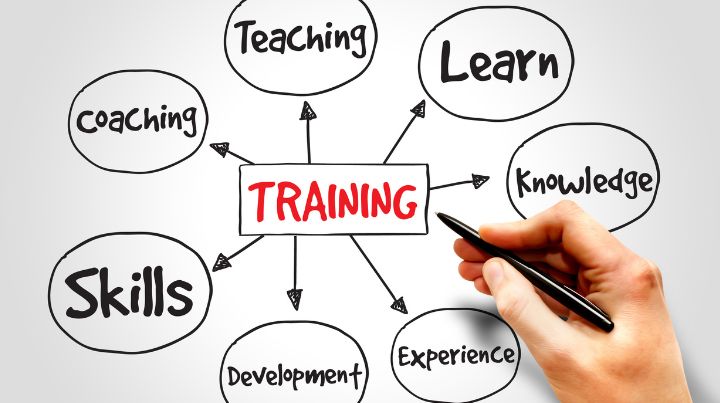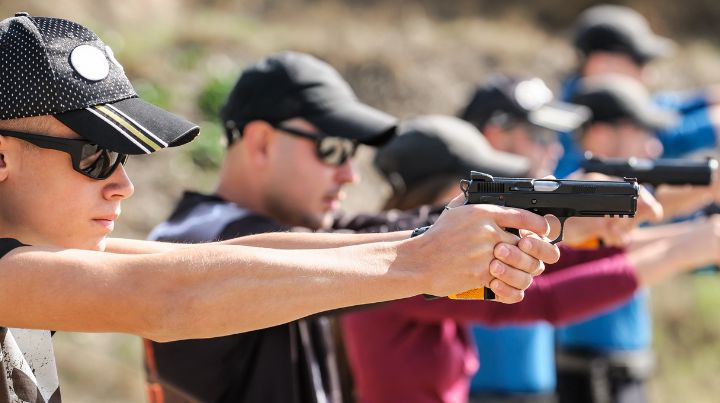Survival Training: How to Choose a Great Instructor

In my previous article, I talked about some specific instances that were red flags to me related to firearms instructors. I had several people reach out to me and ask, “How do I choose an instructor?”. In this article, I’ll discuss some specific attributes that I would look for in an instructor, whether it be for firearms or any other discipline related to security, preparedness, and survival.
First, let’s talk about what kind of training you should be seeking. If you’ve found Mind4Survival, then you’ll know that there’s a never-ending list of skill sets you should probably have to prevail when life throws the poo at the oscillating wind generator. These skills might include gardening, driving, first aid, financial planning, and of course, firearms and tactics. There are plenty of subjects to cover, and I encourage you to take a hard look at where you are with any of those skill sets and be brutally honest about your abilities. By my observations, the Dunning-Kruger effect is very, very real.
In this day and age of social media, it can be very challenging to sort the wheat from the chaff. There are plenty of people putting out content that shows them kitted out with all the newest gear, fancy guns, dual tube night vision, diving into doors of a shoothouse, all while a rap or metal song plays in the background. To be clear, I love these types of videos, but that IS NOT what I look for in an instructor. The benefit of social media is that we can see instructors from all over the country. What should we be looking for? What questions should we ask?
Been There, Done That
First, let’s talk about background. In most cases, I think it’s very important to have a background in the subject matter being taught. The depth and breadth can be a little more tricky to decipher. I’ll give a couple of examples.
My Navy SERE Instructor Time
As part of my time in the Navy, I was a SERE (Survival, Evasion, Resistance, Escape) Instructor. While fully qualified in all aspects of SERE, I specifically focused on Resistance to Exploitation and Interrogation. Was I ever held captive as a prisoner of war or a hostage?? No, unless you count some short stints in jail as a youth. Spoiler alert, almost none of the instructors had been a prisoner of war or hostage, except for a few. The way we made sure we were presenting useful information in a meaningful manner was to first, go to the Basic Instructor Training course for the Navy, second, successfully complete a level C SERE school, third, spend months training to become a SERE instructor, fourth, continue our professional development with other associates courses, and finally, we would consume every case study of someone held captive that we could find.
The JPRA (Joint Personnel Recovery Agency) would debrief any service member that had been isolated and provide “lessons learned” to all branches of the armed services SERE schools. The JPRA also pushed down relevant curricula as our adversaries changed tactics and did evaluations of the services’ various SERE schools to ensure we had good instructors teaching the pertinent information in an effective manner. While very few of us had been a captive, the schoolhouse and the system in place ensured that we had a level of legitimacy in our instruction.
Firearms and Tactics Courses
Another example would be taking a firearms or tactics course from someone that has deployed several times to various war zones in an operational capacity. This would be the definition of “been there, done that,” but it’s not the ONLY criterion. Here’s where things can get tricky.
When I owned a training company near Ft. Bragg (yep, still calling it Ft. Bragg), I was fortunate enough to train with some of the world’s best firearms instructors, several of them from a Special Mission Unit located near there. Some of the instructors were a part of the training cadre for that unit, and some were not. When I would ask some of those men that had been a part of that training cadre about someone else from that unit, the comments would often be, “great guy, hell of an operator, but not an S&T guy…” S&T is Shooting and Tactics, and they are the guys that put all the selectees and support personnel through OTC (Operator Training Course).
It’s Not Just Trash-Talking
When I first heard this, I thought it was just trash-talking, but I understand now that those instructors that taught OTC had hundreds, if not thousands, of hours TEACHING. They had hundreds of specific drills in their back pocket to impart the skills needed to perform tasks at the highest level. That’s not to say that if they weren’t an instructor at a certain unit that they aren’t a great instructor, but there are levels to this.
One great example is Chuck Pressburg of Presscheck Training and Consulting. As far as I know, he was never in a specific instructor billet, although I know some of his jobs in the military had instruction as a part of his operational capacity (more on that later), and he’s an incredible instructor with more knowledge than most and conveys it in a very personable and digestible manner. On the other hand, I have trained with another very famous, experienced Operator, and he’s a terrible instructor, full stop.
There are specific entities that teach as part of their core capabilities. Special Forces soldiers have FID (Foreign Internal Defense) as part of their role. This means they teach local nationals in warfare. This is one of the reasons all SF soldiers go through language school. They have to be able to communicate effectively with local nationals of the host nation. They are taught to teach. Again, that’s not to say all SF guys can teach, but if a retired SF guy has ever done FID, he’s probably reasonably adept at training us, lowly civilians.
The Weird World of Secrecy
One thing that I’ve seen as an issue is the weird world of secrecy. Many guys with a background have been bred to keep their mouths shut. There’s this thing called a quiet professional, and it’s real. There’s a spectrum of how much someone will discuss their pedigree. Some instructors will be very cryptic about their past, and others will give you the launch codes. You, as a potential student, need to do your own due diligence about the potential instructor.
My experience tells me if they talk too much about their background, they’re probably a little full of shit. Conversely, if they don’t say enough about it, they’re probably also full of shit. There’s a sweet spot, and in this day and age, it’s a rare guy that doesn’t at least let you know broadly who they worked for, where they worked, and what they’ve done related to what they’re training.
Is It Their Skill Set?
Another nuanced detail of the experience and background of a potential instructor is the specific skillset being taught actually being a part of their operational role. While many people from high-end entities are very well-rounded, I’d try to ensure what they are teaching you is legitimately within their wheelhouse. If you want to learn about concealed carry and low-profile operations, then a guy from GRS (Global Response Staff) might be a better choice than a MARSOC (Marine Forces Special Operations Command) Marine. Conversely, if I wanted to learn Long Range Reconnaissance Patrolling, I would probably look toward someone from MARSOC. That’s not to say a guy from either of those backgrounds couldn’t teach either subject, but I’m trying to give you examples to understand that the RIGHT background matters.
Personality Also Matters
I previously mentioned an instructor I would not recommend. What’s my biggest reason? He was kind of an asshole. He was a challenge to work with on the backside because he was hyper-focused on the money aspect, he was condescending to the students, and he didn’t have any followthrough with the students afterward. Most of the instructors I know and recommend are the exact opposite of this. Some instructors can be on the upper end of trash-talking, but it’s a very different thing than alienating the students. The late Pat Rogers talked more shit than any instructor, yet did it in such a comical and endearing way that made most of his students relished his jabbing.
Another thing I would consider is an instructor’s student body demographic. If an instructor has only ever taught military or law enforcement students, they might not be great at teaching kids, soccer moms, etc. it’s not necessarily the content. It might just be the delivery of that specific instructor.
Doing It For The ‘Gram
As I mentioned, we are living in a time where there is lots of cool content about skill sets. I’d recommend having a critical eye. Is the person in the video just showing how awesome they are, or can you see how they perform AND how they put out information? Does the video content show skillsets that are relevant to your personal training pipeline? Just because someone can perform a J-turn in a vehicle doesn’t mean they can teach you effective driving techniques.
A Social Media Following Does Not Make a Good Instructor
Social media can be an incredibly effective tool in building a brand, but just because someone has a polished video or lots of followers doesn’t always mean they are a good instructor. Listen to what they say, how they say it, and what content they’re pushing to determine if they might be a good fit for you.
Another thing to look for is the variety of locations and/or number of classes the instructor is teaching. If you’re seeing an instructor or training company teaching full classes at their home range or around the country, it probably means they’re putting out a decent product. There are exceptions to this, but it can be an indication of how legitimate the instruction is.
One other benefit of social media and forums is seeing the recognition of the instructor’s peers. If you see an instructor getting a public endorsement from other instructors that do it for a living and have the right kind of background, you can be reasonably confident the instructor has the chops.
Crawl, Walk, Run
For as long as I can remember, students want to skip the fundamental skills and jump right into more advanced skill sets. As such, there can be a dynamic where a large mix of student experience and training are in the same class. This sucks for everyone involved. The instructor will have to slow down the pace and content for the more advanced students, and the new students might be in over their heads trying to keep up. This usually occurs with an instructor that is just starting out and is trying to fill the class with enough students to make it a financially viable course.
A good instructor will have courses for the beginner, intermediate, and advanced students and do their best to keep students at the appropriate level of instruction. As a potential student, I don’t recommend weaseling your way into a class that’s too far above your current ability and understanding. You might get through the class, but you’ll miss critical steps in your development.
A Man Has to Know His Limitations
While I put a premium on instructors with a high fidelity of operational and instructional experience, I completely understand that there are really good instructors that don’t fall into my exact criteria. It might be that a local instructor is heavily invested with time and money in a subject matter, and they are just starting out. That’s fine, with one additional caveat; they have to know their limitations.
If a local instructor has only taken a few courses from the other local instructor and maybe has a simple NRA instructor certification, then they should only be teaching to that level. This type of instructor shouldn’t be teaching intermediate or advanced skills. They should also be charging well below national-level instructors with legitimate operational and instructional backgrounds. It’s a free country, so they can charge whatever they want, but that doesn’t mean you should be paying excessive pricing for instruction. The rates should be commensurate with the level of instruction.
Appropriate Safety Measures
This is a subject that I’m going to harp on a bit. Certain subject matter has an inherent level of risk to it. Firearms and tactics, vehicle operations, and fieldcraft come to mind. Appropriate safety measures must be in place. There should ALWAYS be a safety brief before any training starts. To be clear, there is such a thing as too much safety as well, which is why I say “appropriate safety measures”. That means mechanisms are in place to mitigate risk for a certain training evolution with a particular level of students. An instructor should absolutely know these mechanisms, have a plan, and brief it effectively so all students know what’s going on.
Be on the Look out for Safety Issues
As a student, you should be looking for any activity that you feel unsafe. Here’s a clue, if you see a video of an instructor doing something with his students and the entire internet is heckling the instructor, you may want to steer clear. If you find yourself in a class and there’s something you don’t think is safe, please say something. We all have different tolerances for risk, and you shouldn’t do anything that feels unsafe. A good instructor should be able to talk through the safety mechanisms in place and not be butthurt that you may not want to do a specific drill or activity.
Please realize that just because you might be new to a certain subject or maybe had limited training doesn’t mean that some practices are unsafe just because someone else did it differently. There’s an old saying that competence breeds confidence. That goes for training too. As you become more competent, you will have a better understanding of the subject matter and the safety mechanisms in place for specific tasks.
If you’re used to running a cold range, meaning you clear and safe your firearms before you take a break, then running a hot range (keeping your firearm holstered during breaks) might seem unsafe TO YOU. It’s absolutely not with the appropriate level of training having already occurred and other safety measures in place. In this example, things like the adherence to the 4 firearms safety rules, a COMMS plan, MEDEVAC plan, medical kits, and designated personnel and vehicles (with redundancy) for emergency situations are good examples of appropriate safety mechanisms in place.
Those Who Can't, Teach
I’m sure you’ve heard this before. Personally, I think it’s mostly bullshit. The negative connotations that come from it are grossly misconstrued, and it doesn’t do you or the industry any favors. Yes, there are certain organizations that have exiled a problem child to an instructor role. I don’t think this is the norm, and if the previous criteria are met, such as a professional background, good personality, ability to convey information to a high fidelity, and they are respected by their peers, then the old saying doesn’t apply. If someone can’t perform what they’re teaching, and they haven’t performed it “for real,” then they probably shouldn’t be teaching at all.
The Bottom Line on How to Choose a Great Instructor
A couple of years ago, I took up archery. I bought an inexpensive, used bow. I asked the local bow hunters who they’d recommend for some training. It turns out the owner of the local archery shop puts on classes. I had never even drawn a bow back before. So there I was, standing next to the 9-year-old kid, both of us learning this skill set for the first time. She had the training background, respect of her peers, and a great delivery of material. I took a couple of lessons from her and then practiced….A LOT. I stop in the shop every once in a while, and she checks on my progress. Her instruction was worth every dime, and I have no regrets.
If you apply your own due diligence, select a good instructor, take a course appropriate for your skill level, and keep an open mind, you will gather the skillsets necessary to survive and thrive in whatever this crazy world throws at you.
What do you look for when choosing an instructor? Have you had experiences that may help others with choosing an instructor? Tell us in the comments below.
Additional Resources:
Related Articles
FREE Guide
Read the Best Seller
Join Mind4Survival
Stay informed by joining the Mind4Survival! 100% Secure! 0% Spam!
Affiliate Disclosure...
Mind4Survival is a free, reader-supported information resource. If you make a purchase through our link, we may, at no cost to you, receive an affiliate commission.
Do You Want To Be Ready No Matter What?

Download our free 39-page guide with interactive, 7-Day Emergency Kit Checklist and take the first step toward real preparedness.
- Know exactly where to start.
- Save time and money.
- How-to build a complete Basic Emergency Kit.
- Level up your safety and security.
Join Mind4Survival
Stay informed by joining the Mind4Survival! 100% Secure! 0% Spam!








Well written concise, and informative. I can tell it was written by a dog that that ain’t afraid to learn new tricks.